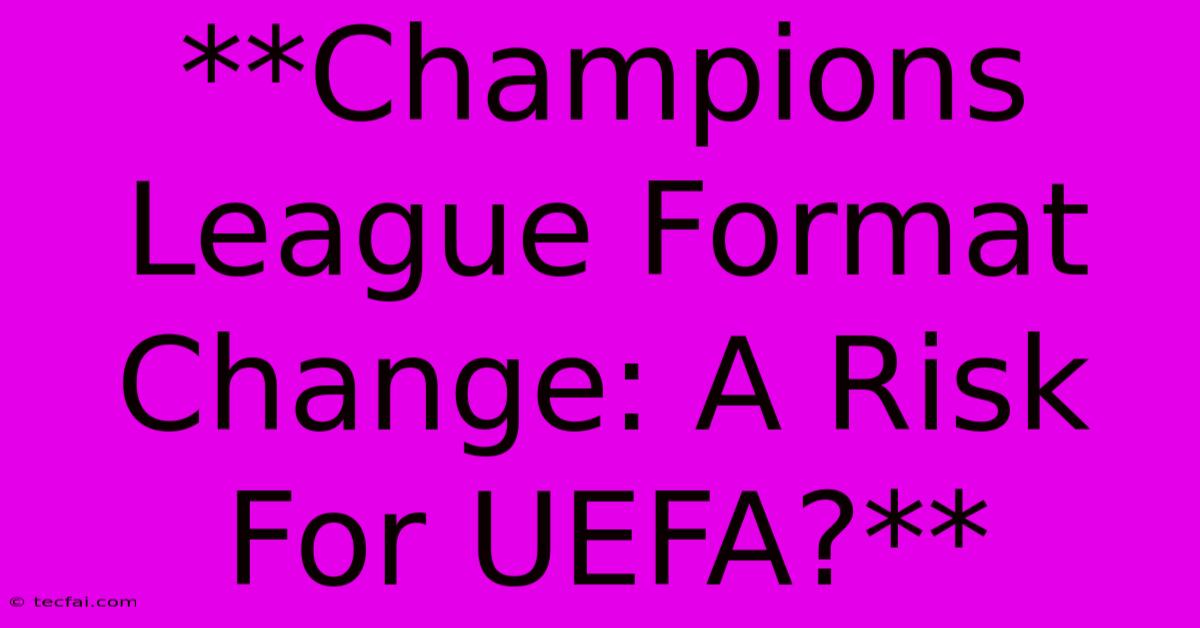**Champions League Format Change: A Risk For UEFA?**

Discover more detailed and exciting information on our website. Click the link below to start your adventure: Visit Best Website tecfai.com. Don't miss out!
Table of Contents
Champions League Format Change: A Risk For UEFA?
The UEFA Champions League, Europe's premier club competition, is undergoing a major overhaul for the 2024-25 season. The new format, which expands the tournament to 36 teams and introduces a "Swiss model" group stage, has sparked debate and controversy. While UEFA touts these changes as a way to enhance the competition and increase revenue, some argue that they could pose significant risks, particularly for the organization itself.
What's New?
The key changes to the Champions League format include:
- Expansion: From 32 to 36 teams.
- Swiss Model: A single league with each team playing 10 matches against different opponents, instead of the traditional group stage with eight groups of four teams.
- Qualification: The top eight teams in the table after the Swiss model group stage automatically qualify for the knockout rounds, while the teams ranked ninth to 24th will compete in two-legged play-off matches to determine the remaining eight knockout spots.
Potential Benefits
The new format aims to achieve the following:
- Increased Revenue: More teams and matches translate into higher broadcast and sponsorship deals for UEFA.
- Greater Competition: The Swiss model provides more opportunities for teams to face diverse opponents, potentially creating more thrilling and unpredictable encounters.
- Enhanced Fan Engagement: More matches and a more dynamic group stage could attract wider audiences.
Potential Risks
However, the format change also carries significant risks for UEFA:
- Diminished Prestige: Expanding the tournament could dilute the prestige and exclusivity associated with the Champions League.
- Reduced Match Quality: With more teams participating, the overall quality of matches in the group stage could decline, potentially leading to less exciting and competitive games.
- Loss of Traditional Format: Many fans and stakeholders are deeply attached to the existing group stage format, and a drastic change could alienate them.
- Financial Uncertainty: The expansion could create financial imbalances between clubs, with some teams benefiting more than others from increased participation.
- Distortion of Domestic Leagues: Increased Champions League participation could potentially overshadow domestic competitions.
A Risky Move
While UEFA is optimistic about the new format's potential, the risks are undeniable. The Champions League's legacy and allure are built on its exclusivity and prestige, and expanding the tournament could ultimately diminish those qualities. The long-term impact of the changes remains to be seen, but UEFA should proceed cautiously and be prepared to address any unforeseen consequences.
Conclusion
The Champions League format change is a significant gamble for UEFA. While it aims to address financial concerns and increase fan engagement, the potential risks are considerable. Only time will tell whether this bold move will ultimately benefit the competition or leave it with a diminished reputation and dwindling fan interest. The future of Europe's most prestigious club competition hangs in the balance.

Thank you for visiting our website wich cover about **Champions League Format Change: A Risk For UEFA?**. We hope the information provided has been useful to you. Feel free to contact us if you have any questions or need further assistance. See you next time and dont miss to bookmark.
Featured Posts
-
Voting Tech Centers Comprehensive Study
Nov 05, 2024
-
One Sign Of Hoys Terminal Cancer
Nov 05, 2024
-
Bce To Buy Ziply Fiber Deal Details
Nov 05, 2024
-
Mavericks Vs Pacers Live Stream At Tv
Nov 05, 2024
-
Erna Klum Models Lingerie With Daughter
Nov 05, 2024
